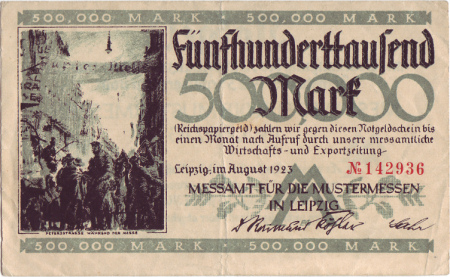

|
23A004 Germany in 1923 by Jim Davies, 1/24/2023
For America in 1923 the future looked bright, but that wasn't so for Germans. Few countries have had a more turbulent history in the last 100 years than theirs. The nation had been formed out of 25 Principalities and Duchies, all of which had been trampled on by Napoleon and felt sore; the complexity of the job made it hard but by 1871 a single Empire emerged. It had made a big mistake by forming an alliance with Austria, under which any attack on either would bring the other to help, and which was matched by the Triple Entente of Britain, France and Russia. Austria and Russia both coveted Serbia, and when the former invaded it Czar Nicholas II invaded Austria and so set in motion the whole dreadful slaughter of WW1. Germany lost. Much worse: the victors savagely blamed Germany for having started it, which she never had; and imposed punishment on her for the non-crime. Thus by 1919 Germans were very sore indeed. The nation lost numerous patches of land and was ordered to pay 132 billion gold marks in "reparation", which was an almost impossible requirement. The population, already starving due to the British naval embargo in 1919 that was designed to force acceptance of these terms, was by 1923 so angry as to spawn active, armed street mobs calling for either Bolshevism or, through a new party formed for the purpose, for a German revival and repudiation of the Versailles diktat. This was the National Socialist German Workers' Party, abbreviated "Nazi"; its title was picked to rival the Bolsheviks and attract the working classes, but the key policy was shown in the first word. Above all, the Nazis glorified the Nation of Germany and demanded its restoration to former strength. Ten years after 1923, they had won the power to do so. 
But in 1923 the anguish in Germany was at its zenith; French troops invaded the Ruhr because reparation payments were late, so to pay some of the 132B "gold" marks, the central bank printed enough marks to buy dollars (which were still close to "as good as" gold) at whatever exchange rate was quoted, and hence produced huge inflation inside Germany. Resentment at the diktat of Versailles was compounded by the distress of hyperinflation. As Thorsten Polleit notes in his Mises article about this, "In 1918 you could have bought 500 billion eggs for the same money you would have to spend five years later for just one egg." The madness was ended abruptly by Schacht as Forbes relates; presumably the French realized that stones cannot yield blood and quit the Ruhr under the Dawes Plan. It had hurt everyone. Chaos in industry led to 28% unemployment, the savings of the middle class were wiped out and farmers refused to sell crops for paper marks. It was gain though for the Nazis; for the more misery the government caused, the more members and support were gained by the NSDAP. Adolf Hitler was its leader and his skills as an orator have yet to be matched, anywhere. In November 1923 the NSDAP attempted a coup in Munich, with support from the highly popular General Ludendorff. The police put it down, with deaths on both sides, and Hitler with other leaders was imprisoned for 5 years - of which he did 9 months, and used them to write Mein Kampf. This can be downloaded (in English) from that link, and makes a fascinating read - apart from its second half, which bored me with his theories about Party organization. Even as a schoolboy Adolf was thrilled with tales of German bravery and power, and his fearlessness as a signals Corporal on the Western Front no doubt fortified his conviction that Germans were a very special, superior people. In the book, there is no sign that he despised or hated his erstwhile enemies, France and Britain; he seemed rather to respect them, as soldiers fighting for their countries. His was a world of violence and supremacy, but he scorned only the soft and spineless, including Slavs. He despised those who betrayed Germany in its hour of need in 1918: Jews and Bolsheviks, who (as he saw it) sabotaged the war by depriving the army of resources. Both those groups, in Hitler's view, had a higher loyalty than to their country: Jews to their race, Bolsheviks to their ideal of international Communism. That's the root of his hatred, and what he wrote in Mein Kampf is what he preached at every rally for the decade after 1923, and which eventually voters endorsed. So in 1923 and -24 the German writing was on the wall: the "peace" of 1919 had been a disaster that generated massive resentment, and there was going to be a big Nationalist resurgence. In the rest of Europe governments had 15 more years to correct their gross error and prevent another bloodbath. They miserably failed.
|
|
||||||||||||||||||||||||||||||||||||||||||||||